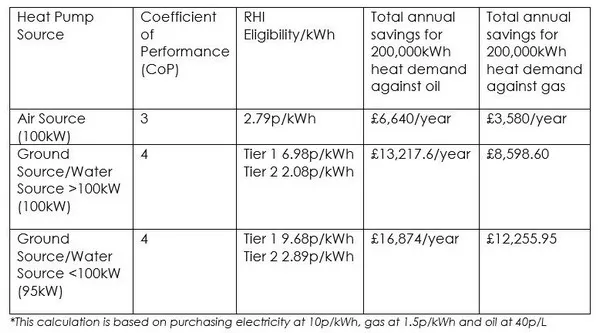A correctly engineered heat pump can be a useful source of heat in most applications and should definitely be considered as a sustainable alternative to fossil fuels. Most people have heard of ground source heat pumps and air-sourced heat pumps. You may even have heard multiple sweeping statements around their efficiency, cost and application. In this ‘heat pumps explained’ guide, CambridgeHOK answers frequently asked questions.
What is a heat pump? How do heat pumps work?
A heat pump is a heating or cooling system. It is the movement of heat from one source to another via a heat exchanger. A heat pump absorbs heat from a cooler external source (as low as -20C) via a refrigerant, which is then compressed, evaporating the refrigerant, and allowing it to absorb heat from its surroundings. This increases the temperature dramatically creating useable heat up to 85C.
What do heat pumps run off?
Heat pumps require electricity to run. The source of the heat can be air, ground, water or waste heat. Typically, a heat pump should produce at least three units of heat for every unit of electricity used. When using electricity from a renewable source, heat pumps are totally carbon neutral. Dual-sourced heat pumps can offer maximum efficiency and flexibility regardless of seasonal variations.
How efficient is a heat pump?
Heat pump efficiency is widely referred to as the ‘Coefficient of Performance’ (CoP). A CoP rating of ‘3’ refers to 3 units of heat being generated for every unit of electricity. An installation generating less than this figure would be classed as inefficient and you would not want one with less than this.
By utilising a ground or water-sourced heat pump, where temperatures are more stable, systems can enjoy a CoP of 4 or 5. If you can increase the input temperature, and reduce the output temperature, you can reduce the amount of work required by the heat pump, therefore increasing its CoP. For example, in industrial situations, where there might be a waste heat source which can be utilised, the CoP will increase and, in return, will deliver a better return on investment.
What is the return on investment for a heat pump?
The return on investment for a heat pump depends on a multitude of factors – including:
- Fuel to be replaced
- Heat pump size
- Source of heat
Below is an estimated guide to the realistic ROI you can achieve, based on a business heat consumption of 200,000kWh per year.

Can a heat pump be used in an old building?
Heat pumps can be utilised for pretty much any heating application. They can be used as a total heating solution or as a supplementary heating solution. However, the temperatures required to heat an old and draughty building would make a heat pump very inefficient – unless you undertook some energy efficiency measures first.
In an old building or industrial process environment, where high temperatures are required, combining a heat pump with another heating solution will allow you to reduce your reliance on fossil fuels, benefit from the Non-Domestic Renewable Heat Incentive (RHI) – and achieve the temperatures required.
Are there any heat pump grants available?
Heat pumps ARE eligible for the UK Government’s innovative Non-Domestic Renewable Heat Incentive. Non-domestic tariff guarantees are available for ground-source and water-sourced heat pumps over 100kW until March 2021. This means you have until March 2022 to get your heat pump installed and still benefit from subsidised heating for 20 years. For heat pumps smaller than 100kW, you have until March 2021 to get them installed and claim for the RHI.
For more information: CambridgeHOK
CambridgeHOK
Wallingfen Park
236 Main Road
Newport, Brough
East Yorkshire
HU15 2RH
Tel: +44(0)1430 449440
info@cambridgeglasshouse.co.uk
www.cambridgehok.co.uk
